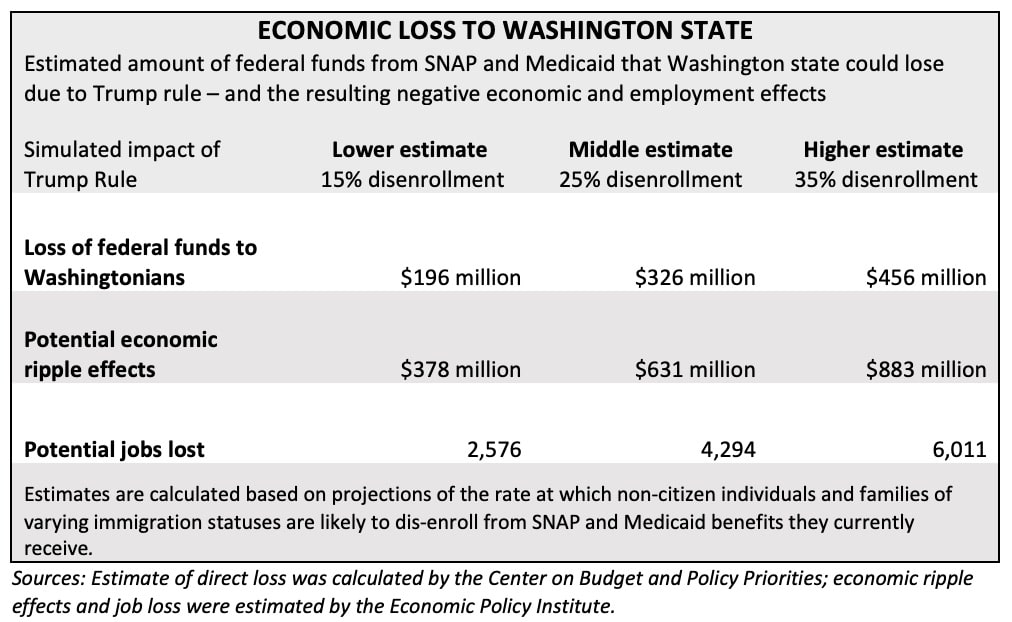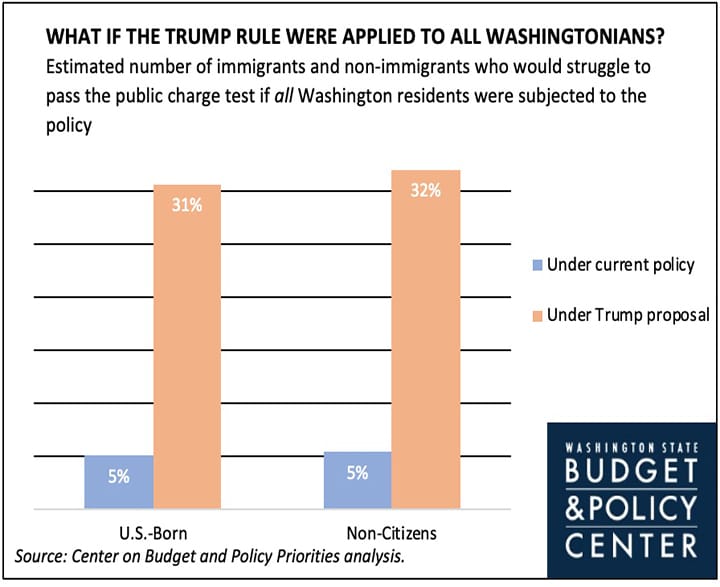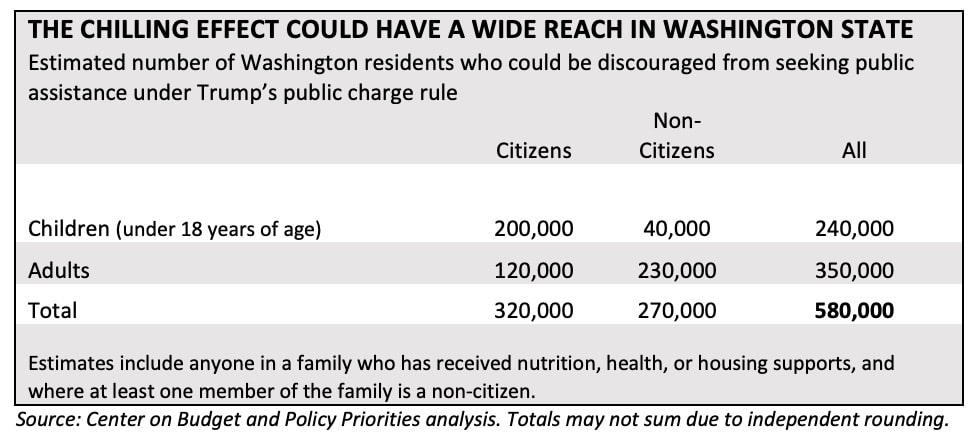Immigrants should not be forced to choose between permanent legal status and the ability to meet their most basic needs. But a Trump Administration proposal to radically re-shape the “public charge” rule (a component of federal immigration policy) would penalize non-citizens for accessing basic benefits that help people get and keep jobs, stay healthy, and put food on the table.
The Trump Administration’s proposed changes to the public charge rule wrongly make it harder for many immigrants to obtain green cards or other visas to enter the United States. Under the proposed rule, immigration officials could reject green card or visa applications if an immigrant has received, or is judged likely to receive in the future, any of a range of health, nutrition, and housing supports. Immigration officials may also consider an individual’s family income, and could reject applications from those who earn less than 125 percent of the poverty line. Overall, the changes would penalize immigrants with low family incomes and favor wealthier immigrants.
At its heart, the administration’s proposal is part of an effort to transform family-based immigration into a vastly more restrictive system. The rule changes would have an outsized impact on Latinx, Asian, and Pacific Islander communities due to current immigration patterns and the disproportionate barriers to economic security these groups face. The administration’s record suggests that these racial disparities are not accidental. Public charge rule changes are an extension of the xenophobia marking Trump’s travel ban, family separation at the southern border, and other policies that seek to bar people of color from entering the U.S.
Trump’s proposal dramatically expands the set of benefit programs considered under the public charge determination. While the current policy considers cash aid from Temporary Assistance to Needy Families, General Assistance, or long-term institutional care, the harsher Trump rule additionally includes Non-Emergency Medicaid, the Supplemental Nutrition Assistance Program (SNAP), Low-Income Subsidy for prescription drug costs under Medicare Part D, and public housing. Officials would be called upon to consider whether a person has received, or is likely to ever receive, even a modest amount from any of these benefit programs. (For additional information, see the Protecting Immigrant Families campaign resources.)
In Washington state, this proposal would harm many immigrants and many more U.S.-born residents connected to them through family.
If the Trump rule were applied to everyone, nearly one in three Washingtonians would struggle to pass the test.
The newly proposed rule changes are highly restrictive and depart significantly from the current policy’s standard. To demonstrate the magnitude of the Trump changes, just consider what the public charge rule would mean if it were applied to all Washingtonians. Hypothetically, if the new standards were applied to U.S-born residents of Washington state (who, as non-immigrants, are not actually subject to the public charge determination), thirty-one percent could be considered a likely public charge.
Similarly, almost one third of immigrants in Washington could also fail the new test. This represents a dramatic increase in the percentage of immigrants who could be considered a public charge, and thus struggle to qualify for a green card or other visa. (See chart below for more details.)
Click on image to enlarge.
The fact is that a large number of Washingtonians – regardless of their immigration status – make use of nutrition, health, and housing supports in any given year in order to make ends meet during hard times. Immigrants do not use public benefits at a higher rate than U.S.-born people, and the new public charge rule sets up an unfair standard.
Over half a million Washingtonians may experience a chilling effect.
Trump’s rule changes could potentially impact up to 580,000 people in Washington, including hundreds of thousands of young children, who may experience a widespread chilling effect 1. (See the chart below.) Beyond its direct effects on immigrants who would be subjected to the new public charge test, the rule is expected to sow fear across immigrant communities, as individuals and families are likely to be frightened and confused about the potential consequences of applying for food, health, and housing supports.
People in families where at least one member is a non-citizen are likely to worry that receiving public benefits could endanger their relative’s immigration status. Some people may choose to forgo benefits that would help meet their basic needs, and others (though not all) could be motivated to disenroll from supports they are currently receiving. This represents a grave risk to the health and well-being of hundreds of thousands of Washingtonians, who could forgo access to health care and adequate food out of fear of repercussions for the immigration statuses of their loved ones.
Trump’s proposal would lead to significant economic loss in Washington state.
The acute harm Trump’s public charge rule would cause for non-citizen individuals, and for families of varying immigration statuses, is expected to have far-reaching effects across our state. As some people who experience the chilling effect disenroll from benefits they currently receive, federal funds from assistance programs like SNAP and Medicaid will disappear from our state economy. The loss of SNAP funding would reduce spending in grocery stores and supermarkets. Similarly, families’ loss of Medicaid coverage would cut into income for hospitals and doctors.2 As families struggle to make up for the resulting increases in food and health care costs, they would reduce their spending in other areas as well.
The Center on Budget and Policy Priorities estimates that if 25 percent of people who currently receive SNAP or Medicaid and belong to families in which at least one member is a non-citizen feel compelled to disenroll from their benefits, Washington would lose $326 million in direct federal dollars. This funding would be taken from the pockets of families with low incomes, the local businesses where they shop, and the workers employed at these businesses. In all, this loss of federal funds could cut up to 4,000 jobs 3; and cost the state about $631 million in lost economic activity 4. The chart below provides these figures as well as estimates of the economic loss that would be sustained at a 15 and 35 percent disenrollment rate 5.
Click on image to enlarge.

The time is now to speak out against this proposal!
Basic nutrition, health, and housing programs are essential supports that help kids reach their full potential, help adults find work, and help families get ahead. Turning to SNAP or Medicare Part D for help with grocery bills or the high cost of prescription medication should not count against someone when they seek a green card or other visa. Instead, immigration policies should safeguard our right to access benefits that help us contribute to our communities and grow the economy.
In Washington – as all across the U.S. – immigrants make invaluable contributions to rich cultural diversity, economic vibrancy, and the collective spirit of our state. Tell the Trump Administration that our state cannot prosper if our immigrant family members, friends, and neighbors are afraid to get the help they need to stay healthy and raise children who thrive.
To speak out, submit comments via the Washington state Protecting Immigrant Families campaign portal. The public comment period is open through Monday, December 10, 2018. The Department of Homeland Security is required by law to review and consider all comments before the proposed rule can take effect. The stories of individuals, families, and community organizations have the power to halt Trump’s harmful proposal. For guidelines on how to submit a unique and effective comment, see this guide from the National Immigration Law Center.


